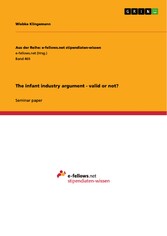Search and Find
Service
The infant industry argument - valid or not?
Seminar paper from the year 2012 in the subject Economics - International Economic Relations, Hamburg University of Applied Sciences, course: International economics, language: English, abstract: 'Even if a domestic industry will, within some years, have a cost advantage over its foreign competitors, when the industry is young its costs will invariably be higher ... [and it must therefore] be protected from lower-cost foreign competition' (Egger, 2006, p.9). The infant industry argument (IIA), initially devised by Alexander Hamilton (in 1791) and Friedrich List (in 1841) (Hoekman, 2001, p. 23), is a widely-used concept to justify the protection of young start-up companies against international competition. By invoking the IIA - which is even recognized by the WTO as a legitimate reason for restricting trade - countries apply protective regulations in favour of their domestic industries through various measures such as tariffs, import quotas and subsidies (Hill, 2009, p. 218). But just like every trade barrier, the argument is intensively discussed and contradicted in economic science. Adversaries of the concept show the danger of abuse, and question its validity in general, referring to the scientifically proven advantages of free trade. By analyzing its pros and cons and showing successful examples as well as downsides of the concept, this paper will therefore examine whether the IIA can be considered to be valid, and if so, under which circumstances it should be applied.
All prices incl. VAT













